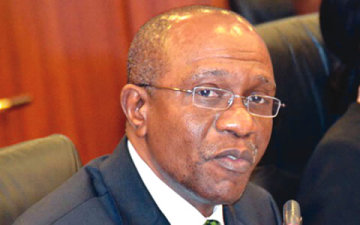-
Black market rate falls to 253 per dollar from 222 last month
-
Money-changers’ association requests meeting with central bank
The black market, or parallel, rate fell to 253 per dollar from 246 on Thursday and 222 last month, according to Aminu Gwadabe, president of the Lagos-based Association of Bureau de Change Operators of Nigeria. That’s 22 percent weaker than the official rate used in the interbank market, which was 198.50 at 5:16 p.m. in Lagos, the commercial capital.
“The central bank will say they don’t care about the parallel market, but investors are looking,” Gwadabe said by phone. “Why will they bring in their money at 197 or 198 when the parallel rate is 250?”
The official rate in Africa’s largest economy has been all but fixed at 198-199 per dollar since March after central bank Governor Godwin Emefiele restricted banks’ ability to buy dollars. In June, he stopped importers of about 40 items, including wheelbarrows and glass, from obtaining foreign-exchange.
Meeting Request
Foreign investors have criticized Nigeria’s stance and sold bonds and stocks this year on expectation of a devaluation, which would cause losses on their holdings in foreign-currency terms.
The naira’s fall in the black market comes as the central bank restricts dollar supplies further to save its foreign reserves, which fell below $30 billion for the first time in four months on Nov. 30. Abound 1,200 money-changers, or 60 percent of the total in Nigeria, were denied their weekly allocation of $30,000 from the central bank on Wednesday, according to Gwadabe.
His association has requested a “crucial” meeting with the Abuja-based regulator on Dec. 8 to address the issue, he said. The phone of Ibrahim Mu’azu, a spokesman for the central bank, was turned off and he didn’t immediately respond to a text message requesting comment.
“If they continue what they’re doing this week, next week will be worse,” Gwadabe said.














